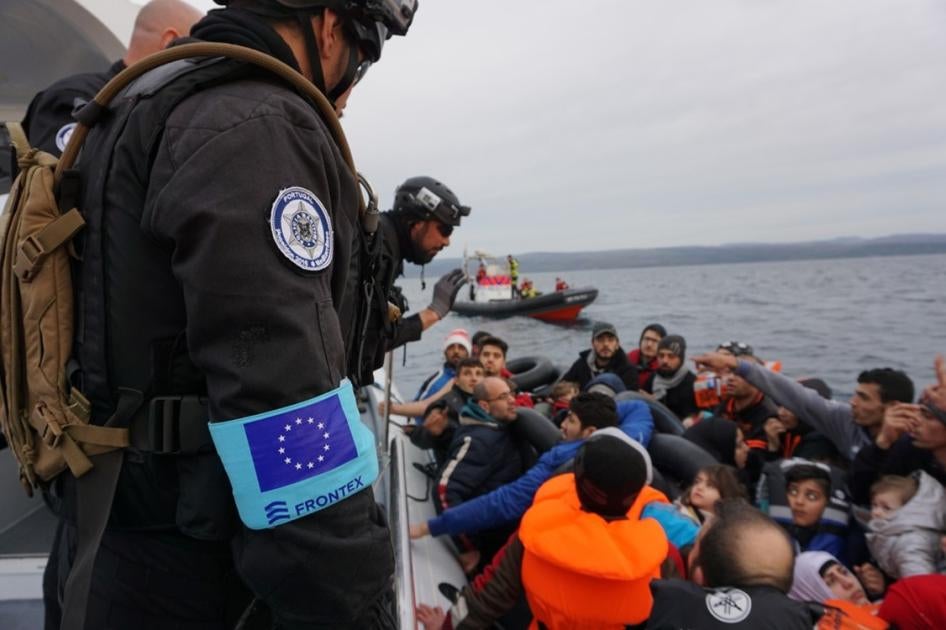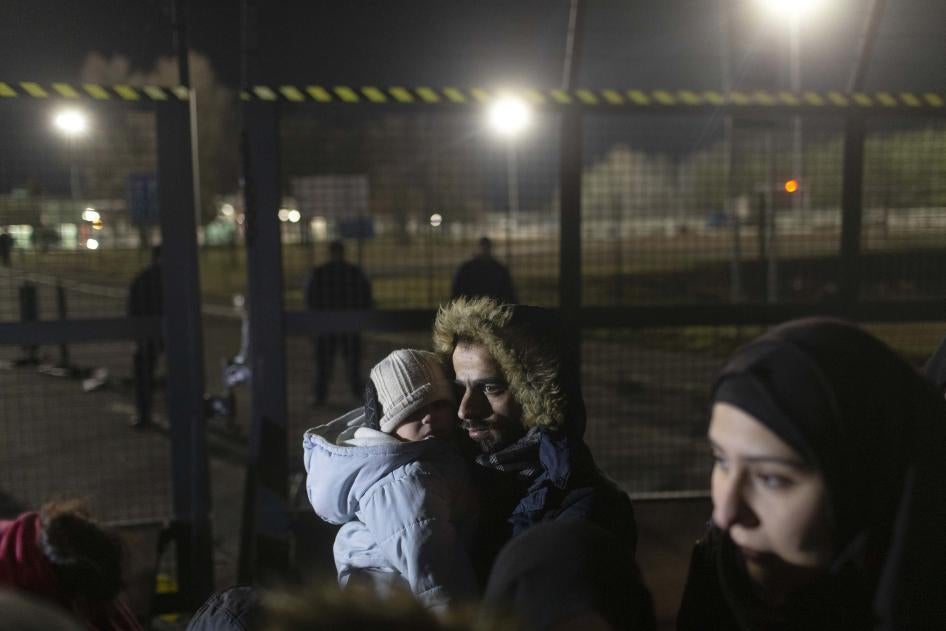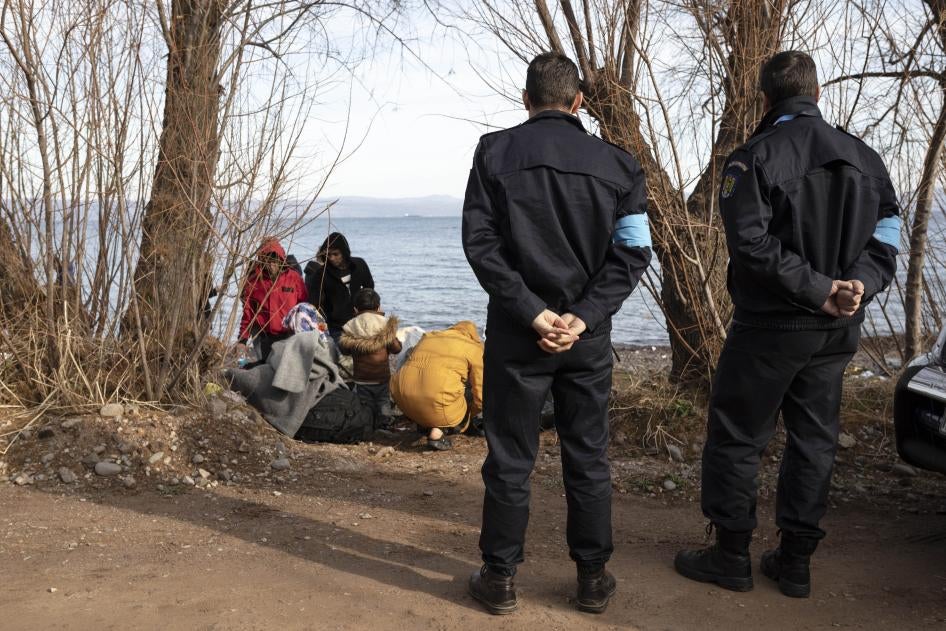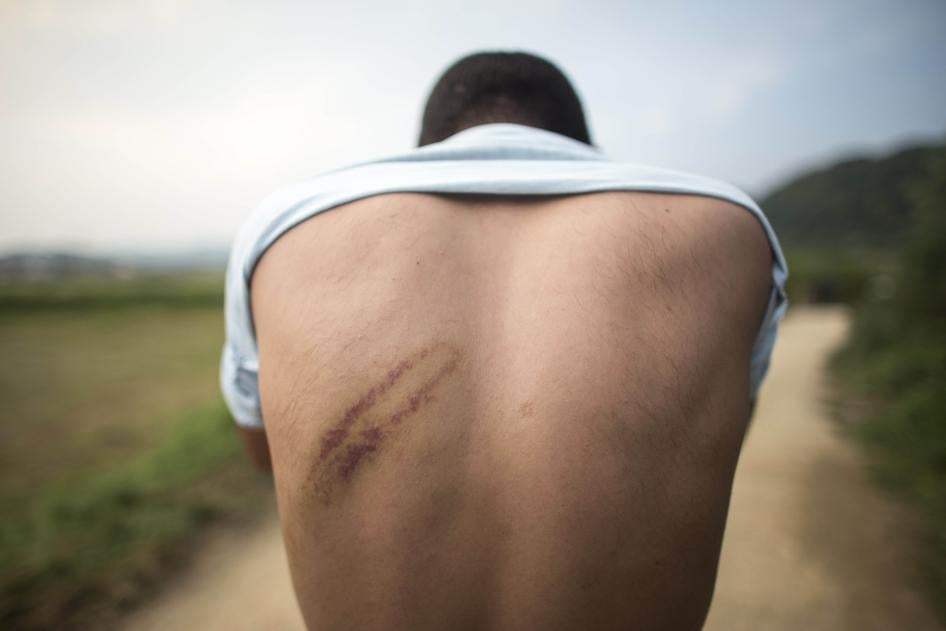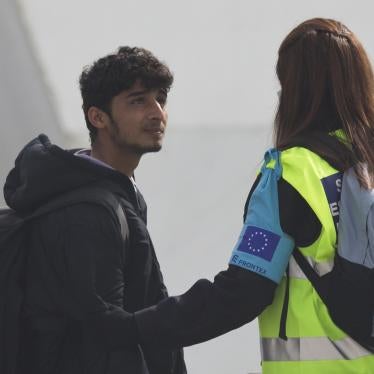(Brussels) – The European Union border guard agency’s oversight mechanisms have failed to safeguard people against serious human rights violations at the EU’s external borders, Human Rights Watch said today.
An analysis of the actions of the European Border and Coast Guard Agency, known as Frontex, shows a pattern of failure to credibly investigate or take steps to mitigate abuses against migrants at EU external borders, even in the face of clear evidence of rights violations.
“Frontex has repeatedly failed to take effective action when allegations of human rights violations are brought to its attention,” said Eva Cossé, Western Europe researcher at Human Rights Watch. “Its rapid growth into an executive agency of the EU, with increased powers, funding, and legal responsibilities makes it all the more urgent for Frontex to put in place effective tools to safeguard fundamental rights.”
Human Rights Watch has examined in detail the situation in three countries where Frontex has major operations and where it failed to act promptly or at all in the face of credible evidence of abuse. On June 8, 2021, Human Rights Watch wrote to Frontex with its findings with the intention of including its response in the report but has yet to receive a response.
European and international nongovernmental groups, including Human Rights Watch, and media outlets have consistently reported abuses— by officials from EU member states against people arriving at EU borders where Frontex is operating. These include violence, illegal pushbacks, and denial of access to asylum by countries including Bulgaria, Croatia, Cyprus, Greece, Hungary, and Malta.
On June 23 Amnesty International is releasing related research on pushbacks from Greece to Turkey, which also includes a call for accountability for Frontex.
Frontex has seven oversight, reporting, and monitoring mechanisms with the stated purpose of ensuring that its officers do not engage in abuse, are held accountable if they do, and are not complicit in abuse by EU member states. They include a system to report serious incidents that has recorded a few incidents but failed to prevent abuse, and hold those responsible accountable. Under Article 46 of the Frontex Regulation, the agency also has a duty to suspend or terminate operations in case of serious abuses, but has only done so once, in Hungary, after a European court ruling.
In Greece, evidence has come to light since October 2020 that Frontex played an active role in concealing and supporting pushbacks of migrants at the land and maritime borders with Turkey. Frontex also went ahead with a rapid border operation (RABIT) in Greece in March 2020, although the Greek authorities had openly put abusive measures in place. These included temporarily suspending access to asylum, prosecuting asylum seekers for irregular entry, and violently forcing them back across the border.
Responding to widely reported allegations of Frontex involvement in illegal pushbacks, the Frontex Management Board created a Working Group in November 2020, consisting of 8 country representatives and the European Commission, to investigate 13 reported incidents in the Aegean Sea maritime border with Turkey. The group reported in March 2021 that there had been no wrongdoing by Greece or Frontex, despite clear evidence to the contrary. It also failed to look into other abuses by Greek authorities in areas where Frontex is operating, including violent pushbacks at Greece’s land border with Turkey.
In Hungary, Frontex failed for four years to take measures to prevent or stop human rights violations, despite reports from the United Nations refugee agency (UNHCR) about Hungary’s abusive treatment of asylum seekers and migrants, calls from Frontex’s own consultative forum on fundamental rights to suspend operations, and legal action by the European Commission against Hungary. Frontex suspended operations only after the EU Court of Justice found in December 2020 that Hungary was breaking EU law.
In Croatia, Frontex maintains its presence despite credible and consistent reports by Human Rights Watch and others of pushbacks, often violent, of migrants and asylum seekers into Bosnia and Herzegovina and Serbia since 2016.
As an EU agency, Frontex is bound to carry out all its operations consistent with the EU Charter of Fundamental Rights (including the right to asylum), the European Convention on Human Rights, and other norms of international law. Human rights law obliges Frontex not to expose anyone to human rights abuse either directly or indirectly and to take necessary measures to protect people from prohibited ill-treatment. Frontex’s own mandate, deriving from the Frontex Regulation, requires all personnel deployed in its operations to respect fundamental rights.
Frontex’s Management Board has expressed concern about the effectiveness of its reporting and monitoring mechanisms, and called for urgent improvements. Similarly, on June 15, the EU Ombudsman published a report that was critical of the functioning of the agency’s complaints mechanism and the role of its fundamental rights officer and made recommendations for reform. The European Parliament is also investigating Frontex operations.
“The European Union and its member states have a collective responsibility to ensure that Frontex operates in accordance with EU and international human rights law standards,” Cossé said. “That can’t happen unless Frontex avoids participation or complicity in abuses and its officials are held to account if they abuse people or put their rights at risk.”
For detailed analysis and recommendations, please see below.
Frontex was founded in 2004 as a European Union border enforcement and management agency. Its duties include enforcing migration control at the EU’s external borders.
Initially, Frontex played a coordinating role, using seconded officers to support member states at EU external borders. Over the last 15 years, its authority has significantly expanded. Its budget has skyrocketed, from 118 million euro in 2011 to 460 million euro in 2020, and is expected to average 800 million euro a year over the next seven years. In 2019 it was given a mandate to set up a standing corps of 10,000 border guards by 2027, giving it significant executive powers.
Frontex is active in numerous joint operations along EU external borders, including in the Mediterranean Sea and the Balkans, working closely with both EU and non-EU states.
Methodology
For the purpose of this report, Human Rights Watch used its previous on-the-ground research in Croatia, Greece, and Hungary documenting abuses taking place at the external borders of those states. It analyzed Frontex’s oversight, reporting, and monitoring mechanisms in operations in those and other countries. Human Rights Watch also reviewed the documents from Frontex and related bodies, and reports and other documents from non-governmental organizations, media organizations, and academics.
The resulting recommendations apply to all places where Frontex is present, including in aerial surveillance operations and cooperation with Libya’s coast guard.
Frontex Under Scrutiny
In October 2020, a joint media investigation concluded that Frontex may have been complicit in human rights violations at the Greek-Turkish maritime border, in the Aegean Sea. It documented six instances between March and August 2020 in which Frontex was either in close proximity to a pushback or directly involved. Journalists reported that asylum seekers and migrants were prevented from reaching EU soil or were forced out of EU waters, in breach of EU and international law.
The allegations of the agency’s complicity in these pushbacks and the serious shortcomings of its reporting and monitoring mechanisms, as well as other concerns about Frontex have led to multiple ongoing investigations by EU bodies: the European Parliament, the European Ombudsman, and the European Anti-Fraud Office.
Frontex has also been accused of enabling the Libyan Coast Guard to intercept migrants in the Central Mediterranean, and then take them back to Libya, where they face nightmarish detention conditions. A joint media investigation reported in April 2021 that since January 2020, Frontex aircraft had flown over migrant boats in at least 20 cases, before Libya’s coast guard intercepted them and towed them back to Libya. Frontex has also been involved in training Libya’s coast guard.
Over the years, Frontex has relied on its coordinating role and lack of executive authority to evade human rights responsibility. In December 2020 Frontex Executive Director Fabrice Leggeri told the European Parliament there was no evidence of Frontex’s involvement in abuses in the Aegean and that only member states had the authority to make operational decisions, implying that Frontex could not be held responsible.
A 2011 investigation by Human Rights Watch into Frontex operations in Greece found the agency was complicit in abuse by handing over migrants it apprehended to Greek police for detention in inhumane conditions.
While some progress has been made since 2011 in clarifying the agency’s human rights obligations, and developing systems for addressing fundamental rights violations, in practice there has been little progress toward ensuring that the deployment of Frontex does not lead to complicity in abuse.
Oversight Mechanisms
Frontex has seven oversight, monitoring, and accountability entities or systems: the Consultative Forum on Fundamental Rights (CFFR), a Fundamental Rights Officer (FRO), fundamental rights monitors; a Serious Incident Reporting mechanism (SIR), an Individual Complaints Mechanism; Forced Return Monitoring, and a duty to suspend or terminate operations or funding in a member state or cancel deployment in case of serious abuses linked to its activities.
Assessment by Human Rights Watch and others of these entities and systems show that they have failed to prevent complicity by Frontex in human rights abuses or to ensure accountability.
Frontex’s Consultative Forum on Fundamental Rights (CFFR) brings together European institutions and international and civil society organizations to advise Frontex on fundamental rights. Frontex should under its mandate consult the CFFR on matters such as the Fundamental Rights Strategy, the functioning of the complaints mechanism, and codes of conduct, and may do so on any other aspect of fundamental rights. But in its seventh annual report, in 2019 the CFFR notes that it was not consulted on the development of the Frontex European Integrated Border Management Strategy.
The forum itself faces barriers to carrying out its tasks, including to “access information about the respect for fundamental rights.” In its report, it said that it lacks the necessary support to fulfill its role, such as a secretariat independent of Frontex.
The Platform for International Cooperation on Undocumented Migrants (PICUM), a network of organizations working to protect undocumented migrants’ human rights, had been a forum member, but stepped down in January. In its statement about leaving, it said that the forum’s working methods don’t allow for meaningful participation, and that it was not consulted on human rights related matters in some cases, that it was not given sufficient notice to review information, and that Frontex often ignored its comments.
Frontex’s fundamental rights officer (FRO) is responsible for handling complaints related to fundamental rights issues and reporting to Frontex and the CFFR. Questions have been raised about the officer’s independence, given that Frontex management hires the officer. Letters published in January 2021 by Statewatch, a group that monitors civil rights in the European Union, outline attempts by Frontex’s executive director, who under applicable regulations should have no role in the appointment, to maintain hierarchical supervision of the role, undermine the post holder, or otherwise limit the officer’s independence.
CFFR has said that the officer “lacks human resources required to adequately fulfil its tasks and to … comply with its fundamental rights obligations.” This “seriously hinders the Agency's ability to deliver on its fundamental rights obligations including on key areas such as Frontex operational activities.”
Fundamental rights monitors were introduced in 2019 and should have been in place by December 2020. The 40 officers, selected and appointed by the fundamental rights officer, are meant to visit Frontex operating areas and report to the officer on possible human rights violations. By the end of April 2021, only 20 had been recruited, according to a media report. Letters published in January by Statewatch go into the some of the reasons behind the failure to hire all 40. On June 15 the EU Ombudsman criticized the delays in hiring the 40 fundamental rights monitors.
Frontex can assist member states to help return people whose protection claims have been rejected to their country of origin. To ensure that these operations comply with EU law, Frontex has established a pool of forced-return monitors. A 2020 EU-funded academic study raised concerns about the effectiveness of this system, noting that the reports from the fundamental rights officer in 2018 and 2019 note serious violations of fundamental rights during joint return operations.
Inadequate Investigations
Frontex oversight mechanisms fail to carry out effective investigations into allegations of abuse during its operations.
The Serious Incident Reporting (SIR) mechanism is the key entity for reporting fundamental rights violations during Frontex operations.
According to the Frontex Code of Conduct, any Frontex officer who believes fundamental rights have been violated during a Frontex operation has the obligation to report this through the SIR mechanism. Yet few incidents are actually reported, and those that are do not lead to changes in practice, as demonstrated by the inquiry conducted by the Management Board Working Group investigation into Greece.
The Frontex Consultative Forum has raised concerns since 2018 about the effectiveness of the SIR mechanism in its annual reports and said it should be reformed. In 2018, Frontex only received 3 serious incident reports of alleged violations of fundamental rights, although independent bodies, including nongovernmental groups, made a much larger number of such reports. On June 15 the EU Ombudsman noted that “the SIR is an elaborate system, involving many participants, with the role of the FRO beginning only later in the process. This may diminish the influence of the FRO.”
A March 2020 case demonstrates the mechanism’s failure. The commander of a Danish patrol boat in the Frontex-run Operation Poseidon in Greece said that after his crew rescued 33 people from a dinghy, Operation Poseidon headquarters ordered his crew to put them back on the dingy and “tow it out of Greek waters.”
Frontex told Human Rights Watch in June 2020 that the Danish crew had been given “incorrect instructions” by the Greek Coast Guard and the “misunderstanding” was later clarified, which Frontex director repeated during a debate in the European Parliament on July 6, 2020.
However, in November, the EU Observer published a redacted email chain from Frontex about the incident that confirms that the Greek Coast Guard gave direct orders in March to the Danish patrol boat to push people back into Turkish waters. Despite the seriousness of the incident, Frontex officials reportedly never filed a serious incident report.
Even when Frontex’s border guards file these reports, little action is taken as highlighted by the Working Group inquiry on Greece, opened in November 2020, which looked at 13 serious incident reports alleging a Greek Coast Guard misconduct. The Working Group report accepted the Greek government’s position without verifying allegations of abuses or contradictory information and gave little indication that the reports were taken seriously. A May report by Der Spiegel said that internal documents included evidence that Frontex’s own human rights watchdog considered the investigations by the consortium of media outlets, including Der Spiegel, on Aegean pushbacks to be based “on solid evidence.”
The Individual Complaints Mechanism was introduced in 2016. It allows anyone whose rights are violated by staff deployed during a Frontex operation to submit a complaint to Frontex. The procedure is managed by the FRO who oversees the admissibility of complaints.
The agency is allowed to conduct a substantive investigation and impose sanctions only when the allegations concern permanent staff. When it comes to Frontex border guards seconded by member states, Frontex can only refer complaints to the member state concerned, and cannot require it to respond.
Moreover, the complaints mechanism cannot be considered an effective remedy within the meaning of article 47 of the EU Charter of Fundamental Rights and article 13 of the European Convention on Human Rights (ECHR). As an employee of Frontex, the rights officer lacks independence. Moreover, even if the rights officer accepts the complaint against a staff member, the Frontex executive director is responsible for investigating it.
According to the June 2021 report by the EU Ombudsman on Frontex accountability mechanisms, between 2016 and January 2021, the FRO received 69 complaints of which 22 were admissible, with no complaints concerning the actions of Frontex staff members. The Ombudsman noted there has been “inadequate transparency in relation to the mechanism’s activities although progress is now being made” and recommended improving complaints handling and follow up and the accessibility of the complaints mechanism to potential victims.
In its March 2020 final report, the Working Group established to look into Frontex operations in the Aegean said that “reporting systems currently in place are not systematically applied, do not allow [Frontex] to have a clear picture of the facts relating to (potential) serious incidents and do not allow for a systematic analysis of fundamental rights concerns.” It added that Frontex “needs to make urgent improvements in this respect.”
Accountability Failures
Organizations including Human Rights Watch and media outlets have reported persistent violations against people arriving at EU borders, including pushbacks in some cases accompanied by violence. This includes in Bulgaria, Croatia, Cyprus, Greece, Hungary, and Malta, countries where Frontex has been working. In no case has Frontex taken clear and credible action to address those abuses or, where the risk has arisen, to avoid complicity in them.
In only one case – Hungary – has Frontex exercised its duty to halt funding or operations or to cancel a planned operation based on serious and persistent violations of fundamental rights related to its activities. However, this suspension came late after years of warnings and only after an EU court ruling.
Frontex’s director told the European Parliament Scrutiny group in March 2021 that article 46 should only be used as a last resort, with warnings and messages to host member states when there are concerns. However, for such an approach to be effective, the agency needs to demonstrate its willingness to take other actions in the interim to ensure improvements, which it has not done.
Hungary
In July 2016, Hungary adopted a new asylum law creating a fictitious “transit” area, eight kilometers inside Hungary’s external border, from which people could be pushed back to Serbia without any possibility to seek asylum. It also trapped asylum seekers in that area in appalling conditions.
In November 2016 the Consultative Forum recommended that Frontex withdraw from Hungary until it could guarantee that people at the border are “given access to an individualized procedure and to asylum … are not summarily returned to Serbia, and that instances of police abuse and violence are investigated.” Frontex never adopted this recommendation, even after the fundamental rights officer made two field visits to Hungary and raised similar concerns.
UNHCR, Human Rights Watch, international human rights bodies, Hungarian civil society, and the media also repeatedly raised concerns that Hungary’s border operations violated human rights, refugee, and EU law. The European Commission pursued legal enforcement action against Hungary over its regime.
It was not until January 27, 2021, that Frontex suspended its operations in Hungary. The move followed a ruling by the European Court of Justice in December 2020 that Hungary “was in breach of EU law” by restricting access to the territory to asylum seekers and migrants and by pushing them back over the Hungarian-Serbian border into Serbia.
A report published by the Hungarian Helsinki Committee on Frontex in January 2021 concluded that Frontex’s human rights compliance mechanisms are ineffective and that the agency did not properly investigate human rights violations. The committee notes in its report that its experience regarding the effectiveness of Frontex complaints mechanism is "very bleak."
Greece
The Frontex operation in Greece is the agency’s largest, with almost 600 guest officers, who perform border surveillance and assist in identifying and registering migrants. Officers have been at the Evros land border with Turkey since 2010, and in the Aegean Sea as part of Operation Poseidon Sea since 2006.
For more than a decade, UNHCR, the IOM, the Council of Europe Commissioner for Human Rights, the Committee for the Prevention of Torture, nongovernmental groups, and media outlets have reported the unlawful return, including through violent pushbacks, of groups and individuals from Greece to Turkey by Greek law enforcement officers or unidentified masked men who appear to be working in tandem with border enforcement officials.
Since 2020 organizations including Human Rights Watch have documented multiple incidents in which Greek Coast Guard personnel, sometimes accompanied by armed masked men, abandoned migrants at sea, violently transferring people from Greek islands or from other boats to motorless rafts, and leaving them adrift near Turkish territorial waters.
Nongovernmental organizations and the media have also reported in 2020 on persistent allegations that Greek border forces carried out pushbacks in some cases with violence through the Evros land border with Turkey. Human Rights Watch has documented such situations in 2008, 2018, and in March and July 2020.
On February 27, 2020, Turkish authorities announced they would no longer stop asylum seekers and migrants from leaving Turkish territory to reach the European Union, leading thousands of asylum seekers and migrants to congregate on the Turkish-Greek border. On March 1 the Greek government suspended access to asylum for 30 days for people irregularly entering the country. It prosecuted people for irregular entry, arbitrarily and summarily detained hundreds of new arrivals, and violently pushed back people attempting to enter Greece.
On March 2, apparently refusing to consider evidence of multiple violations of EU and human rights law by Greece, Frontex announced it was opening “a rapid border intervention” to assist Greece. On March 13, with ongoing human rights violations at Greece’s external borders, Frontex announced the deployment of an additional 100 border guards. These actions by Frontex indicate a disregard for its duty to avoid complicity in human rights abuse and an apparent breach of its own regulations.
In June 2020 Frontex responded to a Human Rights Watch inquiry about the allegations of human rights violations at Greece’s external borders, saying it had received no reports of breaches of fundamental rights in its operations by Frontex officers or by Greek border guards in Greece, and did not have the authority to investigate such allegations.
Despite all of the evidence of wrongdoing by the Greek authorities, the Management Board Working Group concluded in March 2021 that suspending or terminating the Frontex operation under article 46 would not be justified.
Croatia
Human Rights Watch has documented ongoing, summary collective expulsions of migrants and asylum seekers and often abusive pushbacks at borders by Croatia since 2016. Border officials used force and violence, pummeling people with fists and kicking them. They sometimes directed violence at women and children. Border officials abandoned migrants in remote border areas, and in some cases forced them to cross freezing streams at the border with Bosnia and Herzegovina, which is outside the EU external frontier.
The UN special rapporteur on the human rights of migrants, the Fundamental Rights Agency, the Council of Europe commissioner for human rights, and the Parliamentary Assembly of the Council of Europe have all raised concerns about the situation at the border between Croatia and Bosnia and Herzegovina. Croatian authorities have denied allegations of violent pushbacks and failed to take credible steps to halt the practice, including failing to create the independent border monitoring mechanism that the European Commission requested.
In May 2019 Frontex’s director confirmed in a letter to Human Rights Watch that Frontex had an aerial surveillance system since July 2018 on the Croatia-Bosnia and Herzegovina border, but said that Frontex had not detected any events indicating human rights violations, including pushback operations in the area.
The Consultative Forum expressed concerns in 2020 about Frontex’s continued operations in Croatia “given the consistent reports of police violence and pushbacks by Croatian authorities as documented by media and various organisations, including those represented in the Consultative Forum.”
Despite the persistent reports of violations of fundamental rights, and a duty under article 46 to suspend or terminate operations when those violations are of a serious nature or are likely to persist, Frontex continues to operate in Croatia.
Recommendations
Frontex and its Management Board should:
- Ensure that Frontex operations are consistent with its human rights obligations under the EU Charter of Fundamental Rights, and applicable international human rights law in the regions where it operates, including the European Convention on Human Rights, and that Frontex complies with its duty to avoid complicity in abuse;
- Ensure that the Fundamental Rights Officer and Fundamental Rights Monitors have adequate resources and that they have guaranteed independence to investigate allegations of the agency’s direct involvement or complicity in abuses, and act upon their findings and recommendations;
- Suspend under article 46 the funding and deployment of EU border guards to countries that violate European and international standards on human rights, and publicly report on Frontex assessment of information available on violations by host member states and on actions considered and taken under article 46;
- Conduct thorough assessments of the risk of complicity in human rights violations by Frontex in all of its operations, including aerial surveillance, taking into account reports from the Consultative Forum and its members before engaging in joint operations or deploying migration management support teams (former RABIT).
The European Commission, the European Parliament, and the Council of the EU should:
- Establish a legally binding framework to implement article 46 of the Frontex regulation for suspension, termination, and cancellation of operations and funding;
- Empower the European Ombudsman or the European Parliament to refer Frontex to the European Commission for investigation in the event that the Frontex executive director fails to activate article 46 despite persistent and serious rights violations by a host state;
- Set up a credible and independent entity to assess whether the Fundamental Rights Officer and Fundamental Rights Monitors are able to carry out their role credibly and independently and that Frontex effectively acts upon their findings and recommendations, and if needed to directly investigate allegations of the agency’s direct involvement or complicity into abuses;
- Under article 112 of the 2019 Frontex regulation, create a system for joint parliamentary scrutiny, by the European Parliament and national parliaments, similar to that in place for Europol, to ensure the political control of the activities of Frontex in the fulfillment of its mission, including with respect to the impact of Frontex’s activities on fundamental rights;
- Put in place an independent monitoring system, as proposed in the new Pact on Migration and Asylum and required by the Returns Directive, to investigate alleged violations, including by police and border guards of EU member states, and to prevent future transgressions, in accordance with May 2021 guidance by the Council of Europe Committee on the Prevention of Torture.
- Ensure that Frontex funding and material support, including in border and aerial surveillance capacities, do not encourage or contribute to human rights violations in Europe or in third countries;
- Hold member states accountable, including by opening infringement proceedings, for human rights violations committed at the EU’s external borders;
EU member states participating in Frontex activities should:
- Condition deployment of their officials in Frontex operations on ongoing independent assessment that the operation by the host state’s border guards adhere to binding human rights standards, and commit to suspend their participation if credible evidence of violations by Frontex or the host state come to light;
- Ensure that their officials deployed on Frontex missions understand their obligations under EU and international law, and are trained and instructed in their duty to report any incident of abuse they witness both to Frontex and to their national headquarters.
